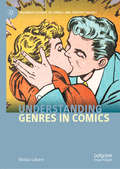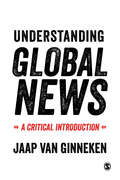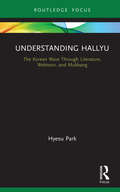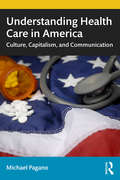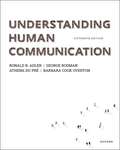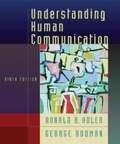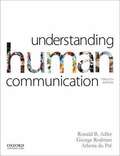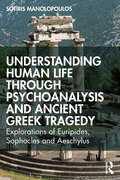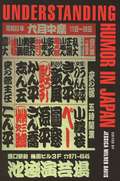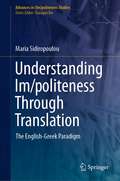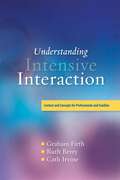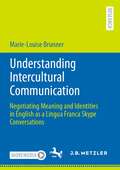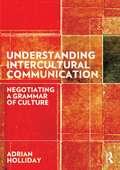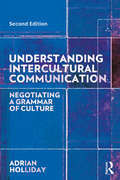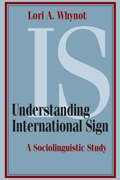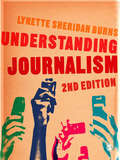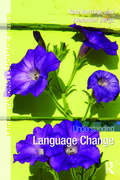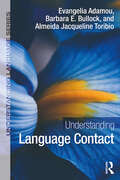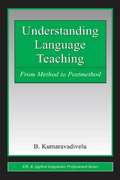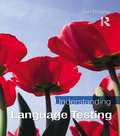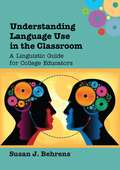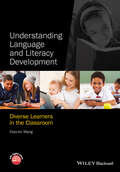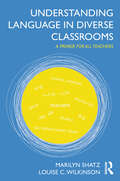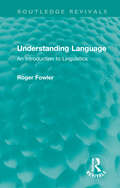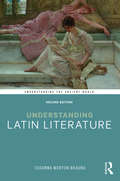- Table View
- List View
Understanding Genres in Comics (Palgrave Studies in Comics and Graphic Novels)
by Nicolas LabarreThis book offers a theoretical framework and numerous cases studies – from early comic books to contemporary graphic novels – to understand the uses of genres in comics. It begins with the assumption that genre is both frequently used and undertheorized in the medium. Drawing from existing genre theories, particularly in film studies, the book pays close attention to the cultural, commercial, and technological specificities of comics in order to ground its account of the dynamics of genre in the medium. While chronicling historical developments, including the way public discourses shaped the horror genre in comics in the 1950s and the genre-defining function of crossovers, the book also examines contemporary practices, such as the use of hashtags and their relations to genres in self-published online comics.
Understanding Global News: A Critical Introduction
by Dr Jaap Van GinnekenA lively and critical introduction to the news media, this book has been written specifically for media students and trainee journalists. Understanding Global News invites the reader to explore contemporary journalistic practice, and questions the assumption that the media provide a mere window on the world. Challenging the often unquestioned notions of media objectivity, the author turns the classic questions: Who? What? When? and Why? onto the news media. By employing a range of theoretical perspectives and a large variety of examples, the author demonstrates the way in which our perceptions of the world are constructed by the news media.
Understanding Hallyu: The Korean Wave Through Literature, Webtoon, and Mukbang
by Hyesu ParkThis book sheds light on aspects of the Korean Wave and Korean media products that are less discussed—Korean literature, webtoon, and mukbang. It explores the making of these Korean popular cultural products and how they work and engage media recipients regardless of their different national, cultural, and geographical backgrounds. Drawing on narrative theory and cultural studies, the book makes a compelling argument about how to analyze the production and consumption of Korean media within and beyond its national boundary with critical eyes. The author shows how transmedial narrative studies (narrative studies across media) offers analytical and theoretical lenses through which one can interpret new and emerging media forms and contents. Furthermore, she explores how these forms and contents can be better understood when they are contextualized within specific time and place using the cultural, social, and political concepts and precepts of the region. The volume will be of great interest to scholars and researchers of Asian Studies, popular culture, contemporary cyberculture, media and culture studies, and literary theory.
Understanding Health Care in America: Culture, Capitalism, and Communication
by Michael PaganoThis book examines the current state of American health care using a social science lens to focus on the interdependent, intercultural, economic, and communication aspects of access and delivery. This text explores how the cultures of health care organizations, health professions, governments, and capitalism, as well as communication, all contribute to a disease-focused, economically driven, technology-centered health care system. It seeks to understand 21st century health care from a macro-level view based on historical realizations and the current plethora of interdependent, but self-serving realities that provide few, if any, incentives for organizational collaboration and change. The fact that the most expensive health care system in the world does not provide the healthiest outcomes is a driving force in this exploration. By reflecting on American values and beliefs regarding health care from philosophical, clinical, communication, and cost perspectives, this text is designed to encourage an organizational transformation at every level, from government to providers to patients. This comprehensive survey is an important guide for those studying, or working in, health care professions, as well as health care policy and administration. It should also be of interest to any reader who seeks to better understand U.S. health care policy from social science, economic, and/or health communication perspectives.
Understanding Human Communication
by Ronald B. Adler George Rodman Copy Barbara Cook Overton Athena du PrÃUnderstanding Human Communication addresses students' perception that they already know how to communicate--an issue faced by every faculty member. By artfully weaving cutting-edge academic research and theory into the clear, down-to-earth, and student-friendly narrative, the authors help students understand the complexity and depth of human communication and public speaking. The series of concepts builds logically through the chapter sequence, enabling students to further deepen their communication skills as they progress through the book. By accessing the text's integrated digital resources--contemporary and brief video clips; tutorials; and self-assessments---students will be able to see concepts applied in real scenarios, making their learning more meaningful.
Understanding Human Communication (Ninth Edition)
by Ronald B. Adler George RodmanWith its comprehensive classroom supplements, and dedicated student-focused pedagogy, this book continues to enliven classrooms and equip students with effective communication skills that will make a difference in their everyday lives.
Understanding Human Communication Twelfth Edition
by Ronald B. Adler George Rodman Athena Du PreFor over three decades, this has been the bestselling text for the Human Communication course. Understanding Human Communication is written with one goal in mind: to provide students with the insights and skills to succeed in our changing world. Fully updated and expanded to include more information on culture and communication, gender and communication, and the effects of technology and social media on communication, this twelfth edition also features two new types of boxes, "Understanding Diversity" and "@Work," as well as new annotated sample speeches.
Understanding Human Life through Psychoanalysis and Ancient Greek Tragedy: Explorations of Euripides, Sophocles and Aeschylus
by Sotiris ManolopoulosDrawing parallels between ancient theatre, the analytic setting, and the workings of psychic life, this book examines the tragedies of Euripides, Sophocles, and Aeschylus through a psychoanalytic lens, with a view of furthering the reader’s understanding of primitive mental states.What lessons can we learn from the tragic poets about psychic life? What can we learn about psychoanalytic work from ancient tragedy and playwrights? Sotiris Manolopolous considers how the key tenets of ancient Greek theatre – passion, conflict, trauma, and tragedy – were focussed on because they could not be spoken of in daily life and how these restraints have continued into contemporary life. Throughout, he considers how theatre can be used to stage political experiences and shows how these experiences are a vital part of understanding an analysand within an analytic setting. Drawing on his own clinical practice, Manolopoulos considers what ancient playwrights might teach us about early, uncontained agonies of annihilation and primitive mental states that manifest themselves both within the individual and the collective experience of contemporary life, such as climate change denial and totalitarian politicians.Drawing on canonical works such as Hippolytus, Orestes, Antigone, and Prometheus Unbound, this book continues the legacy of research that shows how contemporary analysts, students, and scholars can learn from ancient Greek literature and apply it directly to those negatively impacted by the trauma of 21st-century life and politics.
Understanding Humor in Japan
by Jessica Milner DavisJapanese conventions about comedy and laughter are largely unanalyzed. For many students of Japanese culture and visitors to Japan, Japanese humor seems obscure, incomprehensible, paradoxical, and even nonexistent. By bringing together scholarly insights and original research by both Japanese and non-Japanese experts, Jessica Milner Davis bridges the differences between humor in Japan and the West and examines the entire spectrum of Japanese humor, from ancient traditions and surviving rituals of laughter to norms of joke-telling in ordinary conversation in Japan and America. For anyone interested in Japan, Japanese culture, and humor studies, Understanding Humor in Japan is an important teaching tool. It provides accessible, illustrative examples of humor in both Japanese and English with explanations of their meaning and cultural significance. Scholarly yet readable, these essays offer intelligent discussion on such topics as the Japanese delight in wordplay, the comic content of Japanese newspapers, the role of film and television in developing Japanese stand-up comedy, and formal censorship and its impact on humorous writing and self-expression in Japan. Understanding Humor in Japan breaks new ground in the study of humor and sheds light on much that is taken for granted about the role of laughter in civilized societies.
Understanding Im/politeness Through Translation: The English-Greek Paradigm (Advances in (Im)politeness Studies)
by Maria SidiropoulouThis book offers a unique window to the study of im/politeness by looking at a translation perspective, which offers a different set of data and allows further understanding of the phenomenon. In the arena of real-life translation practice, the workings of im/politeness are renegotiated in a different cultural context and thus pragmatically oriented cross-cultural differences become more concrete and tangible. The book focuses on the language pair English and Greek, a strategic choice with Greek as a less widely spoken language and English as a global language. The two languages also differ in their politeness orientation in certain genres, which allows for a fruitful comparison. The volume focuses on press translation first, then translation of academic texts and translation for the stage, and finally audiovisual translation (mainly subtitles). These genres highlight a public, an interactional, and a multimodal dimension in the workings of im/politeness.
Understanding Intensive Interaction
by Graham Firth Ruth Berry Cath IrvineIntensive interaction is a valuable approach, with the potential to radically enhance the well-being of difficult-to-reach individuals, such as those with profound and severe learning disabilities, autistic spectrum conditions and emotional problems. This highly accessible book will help families and professionals develop a deeper understanding of this highly-successful approach and its associated issues, resulting in improved communication opportunities within a variety of care, therapeutic and educational settings. This compendium offers a multidisciplinary perspective to intensive interaction, bringing together the authors' experience and research from different disciplines. A glossary format and thematic structure are employed to enable readers to quickly access topics of interest, and gradually build on their understanding of the approach. Each chapter is devoted to an over-arching concept - including psychological theories of human behaviour, relationship building and maintenance and social inclusion - and illustrated with case studies to support theoretical assertions and offer practical examples of useful techniques. A useful reference and reflective tool, this book will interest both family and professional carers, support staff, special education teachers, learning disability nurses, social services practitioners, speech and language therapists, clinical psychologists, occupational therapists, or anyone who is interested in intensive interaction and wants to learn more.
Understanding Intercultural Communication: Negotiating Meaning and Identities in English as a Lingua Franca Skype Conversations
by Marie-Louise BrunnerToday, academics, business professionals and private persons alike need to communicate successfully and establish relationships with people from various cultures through digital means. These skills have now become essential in virtual environments. This book provides an in-depth analysis of how interlocutors negotiate meaning and identities in intercultural video-mediated communication as an important step to improving interactions on a global scale. It contributes to understanding the complex negotiation processes and strategies involved in communicating successfully and in establishing rapport in an intercultural and video-mediated context. Speakers in this English as a Lingua Franca setting act as accomplished conversationalists who efficiently employ various strategies to make themselves understood and to preempt interactional difficulties. At the same time, interlocutors (re)negotiate identities on various levels in the process of their interactions with conversation partners. Based on these insights, this book concludes with practical suggestions for educational and professional applications.
Understanding Intercultural Communication: Negotiating a Grammar of Culture
by Adrian HollidayIn this book, Adrian Holliday provides a practical framework to help students analyse intercultural communication. Underpinned by a new grammar of culture developed by Holliday, this book will incorporate examples and activities to enable students and professionals to investigate culture on very new, entirely non-essentialist lines. This book will address key issues in intercultural communication including: the positive contribution of people from diverse cultural backgrounds the politics of Self and Other which promote negative stereotyping the basis for a bottom-up approach to globalization in which Periphery cultural realities can gain voice and ownership Written by a key researcher in the field, this book presents cutting edge research and a framework for analysis which will make it essential reading for upper undergraduate and postgraduate students studying intercultural communication and professionals in the field.
Understanding Intercultural Communication: Negotiating a Grammar of Culture
by Adrian HollidayUnderstanding Intercultural Communication provides a practical framework to help readers to understand intercultural communication and to solve intercultural problems. Each chapter exemplifies the everyday intercultural through ethnographic narratives in which people make sense of each other in home, work and study locations. Underpinned by a grammar of culture developed by the author, this book addresses key issues in intercultural communication, including: the positive contribution of people from diverse cultural backgrounds; the politics of Self and Other which promote negative stereotyping; the basis for a de-centred approach to globalisation in which periphery cultural realities can gain voice and ownership. Written by a leading researcher in the field, the new edition of this important text has been revised to invite the reader to reflect and develop their own intercultural and research strategies, and updated to include new ideas that have emerged in Holliday’s own work and elsewhere. This book is a key resource for academics, students and practitioners in intercultural communication and related fields.
Understanding International Sign: A Sociolinguistic Study
by Lori A. WhynotIn Understanding International Sign, Lori A. Whynot examines International Sign (IS) to determine the extent to which signers from different countries comprehend it. She focuses exclusively on expository lecture IS used in conference settings and presents the first empirical research on its effectiveness for communicating rich information to diverse audience members. International Sign is regarded as a lingua franca that is employed by deaf people to communicate with other deaf people who do not share the same conventionalized local sign language. Contrary to widely-held belief, sign languages are not composed of a unified system of universal gestures—rather, they are distinctly different, and most are mutually unintelligible from one another. The phenomenon of IS has emerged through increased global interaction during recent decades, driven by a rise in the number of international conferences and events and by new technologies that allow for enhanced global communication. IS is gaining acceptance for providing communicative access to conference audience members who do not have knowledge of the designated conference languages, and it is being recruited for use due to the prohibitive expense of providing interpreting services in numerous different sign languages. However, it is not known how well audience members understand IS, and it may actually limit equal access to the interpreted information. Whynot compares IS to native sign languages and analyzes the distribution of linguistic elements in the IS lexicon and their combined effect on comprehension. Her findings indicate that audiences with diverse sign languages understand much less of IS presentations than has been previously assumed. Whynot’s research has crucial implications for expository IS usage, training, and interpreting, and it sheds light on the strengths and weaknesses inherent in cross-linguistic, signed contact settings.
Understanding Journalism
by Lynette Sheridan BurnsThe new era of Google, Twitter and Facebook has fundamentally shifted the journalist's relationship with the audience. To navigate these new realities, it is imperative for journalism students to master skills in cross-platform writing, and understand the implications on their communication decisions. This second edition of Understanding Journalism tackles these changes head-on. It integrates media and cultural theory with the step-by-step development of writing skills to give students the techniques and the savvy they need to succeed. Bigger and better, this new edition includes: A new chapter on who journalists are in the social media age Reorganization of journalism skills chapters to bring writing and editing to the fore Full coverage and examples on Twitter, social media, SMS formats In-depth exploration of the ethical issues raised by new media platforms All new exercises, case scenarios and further readings It is the essential guide for all students of journalism.
Understanding Language Change (Understanding Language)
by Kate Burridge Alexander BergsThe Understanding Language series provides approachable, yet authoritative, introductions to all the major topics in linguistics. Ideal for students with little or no prior knowledge of linguistics, each book carefully explains the basics, emphasising understanding of the essential notions rather than arguing for a particular theoretical position.Understanding Language Change offers a complete introduction to historical linguistics and language change. The book takes a step-by-step approach, first by introducing concepts through English examples and building on this with illustrations from other languages. Key features of this introductory text include: up to date and recent case studies at the end of each chapter chapter summaries and exercises that feature a wide range of languages coverage of application of historical linguistics in each chapter glossary of terms This book is essential reading for any students studying Historical Linguistics for the first time.
Understanding Language Contact (Understanding Language)
by Almeida Jacqueline Toribio Evangelia Adamou Barbara E. BullockUnderstanding Language Contact offers an accessible and empirically grounded introduction to contact linguistics. Rather than taking a traditional focus on the outcomes of language contact, this book takes the novel approach of considering these outcomes as an endpoint of bilingualism and multilingualism. Covering speech production and comprehension, language diffusion across different interactional networks and timeframes, and the historical outcomes of contact-induced language change, this book: Discusses both how these areas relate to one another and how they correspond to different theoretical fields and methodologies; Draws together concepts and methodological/theoretical advances from the related fields of bilingualism and sociolinguistics to show how these can shed new light on the traditional field of contact linguistics; Presents up-to-date research in a digestible form; Includes examples from a wide range of contact languages, including Creoles and pidgins; Indigenous, minority, and heritage languages; mixed languages; and immigrants' linguistic practices, to illustrate ideas and concepts; Features exercises to test students’ understanding as well as suggestions for further reading to expand knowledge in specific areas. Written by three experienced teachers and researchers in this area, Understanding Language Contact is key reading for advanced undergraduate and postgraduate students approaching bilingualism and language contact for the first time.
Understanding Language Teaching: From Method to Postmethod (ESL & Applied Linguistics Professional Series)
by B. KumaravadiveluThis book traces the historical development of major language teaching methods in terms of theoretical principles and classroom procedures, and provides a critical evaluation of each. Drawing from seminal, foundational texts and from critical commentaries made by various scholars, Kumaravadivelu examines the profession's current transition from method to postmethod and, in the process, elucidates the relationship between theory, research, and practice. The chief objective is to help readers see the pattern that connects language, learning, teaching methods, and postmethod perspectives.In this book, Kumaravadivelu:*brings together a critical vision of L2 learning and teaching--a vision founded at once on historical development and contemporary thought;*connects findings of up-to-date research in L2 learning with issues in L2 teaching thus making the reader aware of the relationship between theory, research and practice;*presents language teaching methods within a coherent framework of language-, learner-, and learning-centered pedagogies, thus helping the reader to see how they are related to each other;*shows how the three categories of methods evolved historically leading ultimately (and inevitably) to the emergence of a postmethod condition; and*provides the reader with a solid background in several interconnected areas of L2 pedagogy, such as concepts of competence, input factors, intake processes, interactional modifications, and instructional design.Understanding Language Teaching: From Method to Postmethod is intended for an international audience of teacher educators, practicing teachers and graduate students, researchers, curriculum planners, and materials designers in the field of second and foreign language teaching.
Understanding Language Testing (Understanding Language)
by Dan DouglasUnderstanding Language Testing presents an introduction to language tests and the process of test development that starts at the very beginning. Assuming no knowledge of the field, the book promotes a practical understanding of language testing using examples from a variety of languages. While grounded on solid theoretical principles, the book focuses on fostering a true understanding of the various uses of language tests and the process of test development, scoring test performance, analyzing and interpreting test results, and above all, using tests as ethically and fairly as possible so that test takers are given every opportunity to do their best, to learn as much as possible, and feel positive about their language learning. Each chapter includes a summary, suggestions for further reading, and exercises. As such this is the ideal book for both beginning students of linguistics and language education, or anyone in a related discipline looking for a first introduction to language testing.
Understanding Language Use in the Classroom
by Susan J. BehrensIt is clear that a proper understanding of what academic English is and how to use it is crucial for success in college, and yet students face multiple obstacles in acquiring this new 'code', not least that their professors often cannot agree amongst themselves on a definition and a set of rules. Understanding Language Use in the Classroom aims to bring the latest findings in linguistics research on academic English to educators from other disciplines, and to help them help their students learn and achieve. Behrens combines a powerful argument for the importance of explicit teaching of language skills in college with answers to common questions from professors and students, as well as sample teaching materials to help make these issues come alive in the classroom.
Understanding Language and Literacy Development
by Xiao-Lei WangUnderstanding Language and Literacy Development: Diverse Learners in the Classroom offers effective supporting strategies to address the cultural and linguistic diversity of students in contemporary classrooms. Discusses learners with different linguistic abilities--infancy, early childhood, middle childhood, and adolescence--by suggesting effective ways to reach them based on their strengths and needs Emphasizes language and literacy supporting strategies in a variety of everyday classroom settings Includes activities and questions to motivate readers to think and develop their own perspectives on language and literacy development Considers a variety of different language acquisition experiences, including monolingual, multilingual, and language impairment Discusses different types of literacies, including digital and hypertext Connects language and literacy development to identity and motivation to contextualize learning styles for pre-service teachers Supported by a companion website that includes additional resources such as PowerPoint presentations by chapter and a summary of relevant information from the Common Core K-12 English Language Arts Standards
Understanding Language in Diverse Classrooms: A Primer for All Teachers
by Marilyn Shatz Louise C. WilkinsonWith the increasing linguistic and cultural diversity of students in U. S. schools, all teachers, regardless of the content area or grade they teach, need research-based strategies for assisting all students to gain English proficiency. This practical, concise guide shows teachers what they need to know about language, how it is learned, how it is used, and how teaching about it can be incorporated into lessons throughout the curriculum. Understanding Language in Diverse Classrooms offers a model of how learning takes place and describes the critical role of teachers in that model. It includes comparison charts showing how some of the most common heritage languages represented among present-day students compare with English, and it provides examples of hands-on materials including checklists, rating scales, and sample lessons to help teachers prepare to teach all their students in diverse classrooms. Each chapter ends with questions to stimulate discussion and reflection on major chapter points, to enable readers to review and evaluate the information and then integrate it into their own practice.
Understanding Language: An Introduction to Linguistics (Routledge Revivals)
by Roger FowlerIt is widely recognized that language is humanity’s most distinctive and valuable faculty. In this work, originally published in 1974, Roger Fowler explains the character and absorbing interest of language. Designed as an introductory text for students and others concerned with human communication, the book is clearly and concisely written, yet it in no way oversimplifies its rich and complicated subject. The opening chapters set the scene by a discussion of the power of language in the social and psychological life of a man, while the main body of the book is an introduction to linguistics, the science of language study. Coverage is provided of the main topics in linguistic description – semantics, syntax, phonetics – as well as of the functions of language, its status in society and its relation to the individual. The reader is invited to participate in some advanced thinking within an up-to-date and consistent linguistic theory. Particular attention is given to the individual as language-learner, since the process of language acquisition illuminates most clearly the naturalness and the complexity of language. The author’s arguments are illustrated with hundreds of examples from English and other languages. Suggestions for further reading are included in the exposition, and the reader who follows the arguments and pursues the carefully arranged bibliographical recommendations will acquire a substantial insight into contemporary linguistics – the most important and advanced of the modern human sciences.
Understanding Latin Literature
by Susanna Morton BraundUnderstanding Latin Literature is a highly accessible, user-friendly work that provides a fresh and illuminating introduction to the most important aspects of Latin prose and poetry. This second edition is heavily revised to reflect recent developments in scholarship, especially in the area of the later reception and reverberations of Latin literature. Chapters are dedicated to Latin writers such as Virgil and Livy and explore how literature related to Roman identity and society. Readers are stimulated and inspired to do their own further reading through engagement with a wide selection of translated extracts and through understanding the different ways in which they can be approached. Central throughout is the theme of the fundamental connections between Latin literature and issues of elite Roman culture. The versatile and accessible structure of Understanding Latin Literature makes it suitable for both individual and class use.
